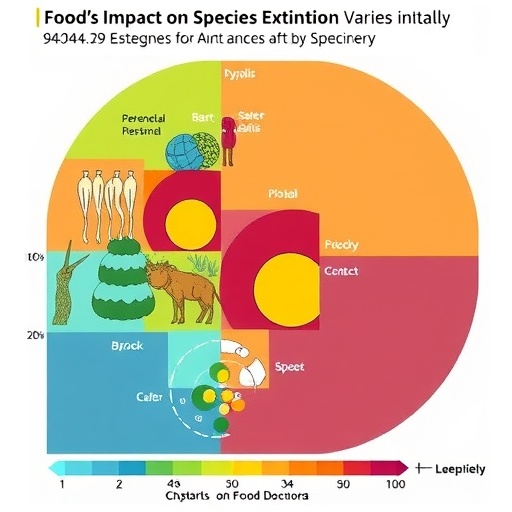In a recent investigation, researchers have unveiled how the dietary choices of various species can substantially influence their extinction risk, revealing a staggering variability that spans three orders of magnitude. This deep dive into the interconnection between food sources and survival probabilities showcases not only the ecological ramifications of contemporary dietary patterns but also underscores the intricate balance required to maintain biodiversity amid environmental changes. The study, published in Nature Food, brings to light the pressing need to reconsider how food systems may be evaluated in conservation biology and policy-making.
The study’s authors, led by T.S. Ball, aimed to determine the extent to which food resources impact species’ vulnerability to extinction. By analyzing numerous species across various ecosystems, they employed models that predict extinction risks based on dietary habits. Their findings illustrate a complex tapestry where different diets can either elevate or mitigate extinction risks significantly. In some cases, species relying on specialized food sources exhibited increased extinction risks, while those with more generalized diets demonstrated resilience.
By categorizing species based on their dietary preferences—herbivores, carnivores, and omnivores—the researchers discovered that shifts in food availability could shift the odds of survival dramatically. Specifically, species that display a high level of dietary specialization tend to show heightened sensitivity to food resource fluctuations. This finding feels particularly relevant, given the ongoing global shifts in food production and agricultural practices, which are increasingly impacting natural ecosystems.
One of the standout revelations of the study is the quantification of the risk differential. The researchers found that extinction risk assessments can differ by a factor of up to a thousand, contingent upon the dietary habits of the species in question. This stark contrast calls for a paradigm shift in how conservation strategies are formulated. Failing to account for dietary influences could yield misleading conclusions about species viability and the efficacy of conservation efforts.
Equipped with robust data and sophisticated modeling techniques, Ball and his colleagues utilized past extinction events as predictive templates. They analyzed how past dietary shifts corresponded with extinction rates across various taxa, revealing trends that can inform future predictions. This retrospection posits that understanding historical dietary behaviors is essential to forecasting which species may be under threat moving forward. It also highlights the critical need for adaptive strategies in biodiversity conservation that recognize the fluid nature of food webs.
The ecological implications of this research extend beyond individual species to ecosystem health as a whole. Because many species serve as keystones in food webs—whether by controlling populations of prey or by fostering plant diversity—the loss of any one species due to food scarcity could trigger cascading effects. This interdependence reinforces the urgency of ensuring that food accessibility remains stable and sustainable across ecological networks.
The study’s findings prompt crucial discussions on policy and sustainability. With a growing global population demanding more food resources, the intense pressure on land use and food production must be carefully navigated. Policy-makers are encouraged to take a nuanced approach that considers the interplay between food systems and biodiversity conservation. Sustainable agricultural practices that support diverse diets may not only enhance food security for humans but also contribute to the stabilization of wildlife populations at risk of extinction.
Furthermore, the research highlights the need for public awareness and education regarding food choices—both at individual and communal levels. By understanding how dietary preferences affect the environment and species survival, there could be a cultural shift towards more sustainable eating habits. This paradigm shift could cultivate an ethos of conservation and stewardship that transcends individual actions and permeates societal norms.
The authors suggest that further interdisciplinary research is warranted, merging insights from ecology, nutrition, agriculture, and economics to create a comprehensive understanding of how food production systems impact biodiversity. Collaborative frameworks that integrate scientific research with community initiatives could foster innovative solutions to mitigate extinction risks linked to dietary habits.
In conclusion, the challenge remains not just to protect species but to understand the underlying factors contributing to their viability. As we venture deeper into an era characterized by climate change and habitat destruction, the relationships uncovered in this study serve as a clarion call for proactive measures. The intricate interplay between food systems and extinction risks cannot be overstated; it is imperative that we adapt our approaches to conserve the rich biodiversity that graces our planet.
The implications of this research will not only guide future conservation strategies but also enhance our understanding of ecological dynamics in a rapidly changing world. As we move forward, it is essential that both the scientific community and society as a whole recognize the profound impact of dietary choices—not only on human health but on the very fabric of life that sustains us all.
By crafting policies that recognize this interconnectedness and advocating for sustainable eating practices, a proactive stance can be taken to safeguard our planet’s biodiversity for generations to come. This is not merely an academic endeavor; it is a critical blueprint for survival, underscoring our collective responsibility towards nature and each other.
Subject of Research: The impact of dietary choices on species extinction risk.
Article Title: Food impacts on species extinction risks can vary by three orders of magnitude.
Article References:
Ball, T.S., Dales, M., Eyres, A. et al. Food impacts on species extinction risks can vary by three orders of magnitude.
Nat Food 6, 848–856 (2025). https://doi.org/10.1038/s43016-025-01224-w
Image Credits: AI Generated
DOI: https://doi.org/10.1038/s43016-025-01224-w
Keywords: biodiversity, extinction risk, dietary choices, conservation, food systems, sustainability, ecological dynamics.




